- Home
- Charles L. Grant
Chariot - [Millennium Quartet 03] Page 2
Chariot - [Millennium Quartet 03] Read online
Page 2
No insurance, no property, no bank accounts, no inheritance.
Out into the world, and the world didn’t smile.
But there were jobs out there, and if his mother had taught him anything, it was not to be too proud to mop floors for a living until you found something better:
So he did.
Eventually working in a doughnut shop in Sacramento, the only job he could get, bored to midnight-in-bed tears because the register didn’t even trust him to record the correct prices, all he had to do was press the little pictures; quoting Tennyson and Sandburg with every sale, mystifying the customers, screwing up the inventory, sitting on a stool in back while the manager, a good five years younger than he, scolded him for not putting his mind to his work; mopping the floor less than twenty minutes to closing when a kid came in, waving a gun, yelling at the girl behind the counter, screaming at the old man huddled at the corner table, turning when Trey swung the mop, knocking the gun loose, but not before it fired wildly and the bullet went through the old man and the window, and everyone said they were sorry, and not one of them believed it.
When he couldn’t find another job, his landlord threw him out, called him an idiot for acting before thinking, calling him a killer, sending him to the streets until his money ran out and his sanity became questionable and a thumb out on the highway brought him to the dragon for the first time, where he fought without half trying, and went back into the world, enough green in his pocket to feed him for a while and get him a tiny room not much bigger than his dreams.
* * * *
3
“Hey! Hey, you guys, hey!”
He released Moonbow’s hand and watched Starshine pelt down the street toward them, arms pumping, knees high. No braids, but a ponytail; shorts, not jeans; sneakers, not sandals; but the same pug nose and the same dimpled chin and the same slightly slanted eyes, this pair accentuated with a different kind of makeup every day.
Their mother must have been looking in a mirror when she had them. At least according to the photograph he’d seen.
“What?” Moonbow snapped.
Oh, great, he thought; wonderful.
Starshine, grinning like a maniac, skipped to a halt in front of them, panting, wiping her forehead with a bare tanned arm. “Nothing.”
“You do your homework?”
The older girl lifted a shoulder. “Most of it. I’ve got time, brat, don’t worry.”
Moonbow scowled. “I’m not doing it for you.”
“Nobody said you had to.”
“Well, I’m not.”
“Big deal.”
“Creep.”
“Brat.”
“Pimples.”
Uh-oh, he thought; low blow.
Starshine stuck out her tongue, looked at Trey for the first time, and said, “Momma wants to know if you’ll stop at the 7-Eleven and pick up some bread on your way back.”
“Sure. Hi.”
Puzzled, she looked at him sideways.
“It’s what you say when you see someone you know. You know? Hi? Hello? How are you? Nice to see you? How you doing? Nice weather we’re having? Think it’s gonna rain? Looks like snow to me, unless we have an earthquake and end up living in the center of the Earth with little guys who live in the dirt walls and have worms for Thanksgiving.”
Moonbow giggled.
“You’re weird,” her sister said.
“Not me, kid. And sure, I’ll get the bread.”
Starshine nodded a thanks, kicked lightly at a pebble, looked up the street. “Mr. Freneau’s getting drunk again.” Quietly. Angrily.
The violins were replaced by singing, too muffled to understand, but there was a pounding beat behind it, and what sounded like clapping.
Trey wasn’t sure what he was supposed to say. He knew the girls had an agenda—get their mother married and out of this place into someplace more reasonable, more civilized . . . more normal.
Since last October their quest had become more intense, even frantic, because the city, last October, decided it was time to try again. Land was too dear to waste on the likes of them. A new developer had been contacted, elaborate new plans drawn and near approval, and everyone in the neighborhood recognized the handwriting in the sand.
Already, most of the seventeen so-called houses were empty, and the leases for the rest would be up at the end of the year. Renewal, this time, was a word in a foreign language;
From the girls’ point of view, it was time to speed things up.
Roger Freneau had been Starshine’s latest target. An associate professor at UNLV. Respectable and respected. Upright. Reasonably good-looking in a stuffy sort of way. Claiming to be a distant relative of a famed Revolutionary War poet and satirist. And lately, good friends with anything that had malt or hops in it, poetic or not. Trey had the feeling the man had been told he wasn’t long for his job. He knew the look well. He’d seen it himself too many damn times.
Moonbow’s target, on the other hand, was obvious; her methods, however, were a lot more subtle.
Trey was just over forty; he believed he had gotten pretty good at dodging.
“He’s a pain,” Starshine said, shaking her head.
“He’s creepy,” Moonbow added.
“Not creepy, just a pain.”
“Maybe. I guess.”
“He’ll be better, though.”
“Right.”
“Momma says he’s just going through a bad patch.”
“Like on my jeans?”
“Not funny, brat. He—not funny.”
Trey reached out, brushed the backs of his fingers across Starshine’s shoulder to get her attention. When she looked, he could see tiny diamonds in the corners of her eyes.
He knew that look, too.
“Sometimes,” he said, “it gets too much, you know? Different people handle it different ways. Sometimes it takes them a while to figure out what’s the best way.”
There was a moment, no longer than that, when her eyes softened. Then: “At least he doesn’t leave.” Shock, fingers splayed to her lips, and she looked to Moonbow for help, but her sister was too stunned to speak.
Trey smiled easily, his hide grown much too thick to be punctured by a wild dart from a kid. “It’s okay, don’t worry about it.” He slipped his hands into his pockets, wrinkled his nose at the sky. “When you think about it, it’s actually pretty much the truth.”
“Used to be,” Moonbow corrected loyally, with an if-looks-could-kill glare at her sister.
He agreed. “Used to be, right. A little money in my tuxedo, a spring in my step, and I’m gone. Outta here. Once again making my way through the corridors of economic power out in the vast canyons of the largest cities in the world. Scared the hell out of them, I did, in the old days. They chased me away every time. Pitchforks, torches, shotguns, tar and feathers, the whole nine yards. They couldn’t stand the incandescent brilliance of myself.”
Starshine grinned in spite of herself. “You’re weird.”
“Thank you.”
“Seriously weird.”
“Such praise,” he admitted, spreading his arms, bowing grandly, “deserves riches beyond compare. Would that I had riches beyond compare to share with you, my dear Miss Levin, but such riches as I have are reserved for greater, more noble things, no offense, like getting that bread for your mother.”
“And the casinos.”
No one spoke.
The wind gusted again, too hot for April.
Trey was used to being the neighborhood anomaly. Most loyal citizens of the city in the middle of the desert didn’t bother much with the casinos. Once in a while, maybe, but they had more important things to do. Like making a living. Many did, at the hotels; many more did, at the stores and schools and scores of other ordinary businesses the outside world didn’t believe existed because all they saw were the lights and the magicians and the showgirls and the wheels.
In the neighborhood, they spoke only of his dragon.
Casino
was a word few ever used.
Starshine had broken a golden rule. She cleared her throat and swiped at an invisible insect. Swiped again, and looked for another pebble to kick, almost sighing aloud in relief when a car pulled up beside them, an old Oldsmobile long enough to be a cruise liner.
“Hey,” she said to the woman in the passenger seat.
“Hey yourself.”
“Going to work?”
“No,” Trey said. “Mrs. Olin has hijacked her husband, and they’re heading for Texas to raise miniature cattle somewhere south of Austin.”
“He’s weird,” Starshine said, leaning down to wave at the man behind the steering wheel. “Hey, Cable.”
“Yeah.” More a grunt than a word.
As far as Trey knew, the man seldom said more than three or four words at a time in public, and only when he was feeling expansive. God only knew what it was like at home. Stephanie, on the other hand, would talk a politician to death if given half a chance. Her ambition was to be a singer; her current job was a showgirl at the Tropicana. He had made it a point, once having met her, never to see her on stage. She was lovely enough as it was; he didn’t need to know how she looked without half her clothes on.
Besides, Cable would tear his head off.
“You going in, Trey?” she asked. A small high voice, long dark hair twisted over one shoulder, her figure hidden in a bulky sweatshirt and matching sweatpants. Legs long enough that Cable had to push the seat back, forcing him to drive virtually straight-arm. “Give you a lift.”
He shook his head. “No, thanks. But thanks.”
“I’ll go,” Starshine said eagerly.
Stephanie smiled. “I don’t think so, hon. Your mother would scalp me.”
“Dope,” Moonbow muttered.
Cable gunned the engine, glaring at the windshield. His complexion was Mediterranean dark, a thick mustache to match wavy dark hair that spread from beneath a baseball cap. He worked at Treasure Island, sweeping up after the gamblers. He took the late shift so he wouldn’t be tempted to watch Stephanie, and the men who tried nightly to pick her up. He trusted her; he didn’t trust his temper.
That was the line.
Trey knew better.
It was his face that kept him under the cap and in the dark. One of the early Sickness victims, lucky to survive but leaving his skin severely pocked and scarred. There were lots of Cables in Las Vegas. Hiding. Judith Levin said it was akin to survivor’s syndrome—guilt they hadn’t died with all the others, and because of the tracks the virus left behind, unable to blend in with those who still lived.
“Come on,” Cable growled. “We’re gonna be late.” He pulled away quickly, Stephanie waggling her fingers in a hasty farewell wave, forcing the others to turn away from the dust the wind scattered a moment later.
“I,” Starshine announced, patting the dust from her T-shirt, “am going to be like her some day.”
Moonbow scoffed silently.
“Well, I am! I’m going to make a lot of money, wear nice clothes, and ...” She turned away. “And get out of here as quick as I can.”
“What about Professor Freneau?” her sister asked, so sweetly it was almost unbearably nasty.
“He’s a drunk. Screw him.”
Moonbow wouldn’t let it go. “But ‘Shine, I thought you liked him.”
“Screw him.”
“But—”
Trey rapped her spine with a knuckle, making her yelp and turn. “Enough,” he told her.
“But—”
“Enough.” A chill walked his arms, and he rubbed them vigorously. The sky was clear, but he felt a storm just the same. “Your sister wants to walk around half-naked all the time, that’s her business.”
Starshine’s eyes widened. “What do you mean, half-naked?”
He gave her a half-smile. “Come on, kid, you ever see Steph’s costume? What there is of it?”
“Well...”
Too dark now, but he could have sworn she blushed.
The music grew. Singing, clapping, old-time gospel with a rambunctious choir that dared the world to end.
Moonbow grimaced. “I hate that stuff.”
Starshine agreed. “She deaf or something?”
“Makes you feel good,” he said, mildly scolding, a playful cuff aimed at their heads. “Besides, the woman’s a star, remember? That’s probably her singing. I wish there was more of it.”
Starshine made a face. “Gross.” She rubbed her stomach. “I’m hungry. Come on, brat, let’s eat. Momma’s gonna be mad if we’re late. I’ll take your plate if you don’t hurry.”
“In a while, okay? Besides, you’ll get fat and won’t be able to go around half-naked.”
Starshine took a half-hearted swipe at her sister’s head and ran off, no good-bye, no wave, slipping in and out of the dark places the porch lights couldn’t reach.
Trey watched until she was gone, listened to the music, didn’t move when Moonbow sidled over and took his head again.
“She’s not your princess, right?” she asked hopefully.
“No,” he answered. “She’s the jester.”
She laughed. “And Momma? What’s she?”
“My executioner, if you don’t get home for supper, kid.”
The wrong answer; he could feel it through her hand.
She wanted him to say his queen.
But queens didn’t marry, or even live with, men like him.
* * * *
one who walks into a school in more cities than he can count, putting on the drab coloration of a janitor’s uniform, sweeping floors, washing windows, washing blackboards, washing walls, talking with students until someone gets nervous and he’s shown the door, politely, because liability was something administrations couldn’t really afford;
never more than three or four months at a time, living in pay-by-night hotels and cardboard boxes and under bridges and in alleys until he can’t stand it anymore and makes his way back to the dragon;
builds a stake;
runs back to the world;
and finds himself increasingly the target of those who think he’s an easy mark, a bum with a few bucks who didn’t deserve them; beaten, once stabbed, once just for the hell of it thrown from a bridge into the Allegheny River; learning to fight, learning to survive, trying to keep in mind that the plagues that have battered them give them no outlets for their frustration; and thinking at last while he lay in the intensive care ward of a hospital in the so-called City of Brotherly Love that it’s all a crock, that he’s just making excuses for people who are just plain rotten.
This time the beating hasn’t been just for kicks; this time whoever it was had been trying to kill him.
After Philadelphia, he makes his way south, into the mountains of West Virginia, eventually into Martinsburg on the interstate, where he meets a young couple, Cora and Reed, nudging at twenty and looking a decade older. He spends three days there, bulky cast on his left arm, hunting a ride west, and in that three days he listens to them talking fretfully, hopefully, about finding a preacher who was supposed to be dead but didn’t die because he was different.
“How?” Trey asked over the mouth of his longneck, through a mouthful of beer. Their treat, just like the dinner he’d just finished.
Cora shrugged. “Different, that’s all.”
“Like you,” Reed told him with a grin.
Trey snorted. “Yeah, sure. What, he’s a drunk?”
“No,” Cora said. “He was the first.”
“The first what?”
She didn’t answer, and neither did the boy. They told him, that last night, of a place not even big enough to be a village, one of those communities that had exploded in the violence that had blown up two years back. Cora and Reed had escaped, hadn’t looked back, and finally decided they had to find the preacher, Casey Chisholm.
“Crazy,” he had told them. “All the crap that’s gone on since, and you’re looking for a guy who’s probably dead? You’re nuts.”
When he wakes up the next morning, they’re gone, not even a note to say good-bye. But there’s money in his jacket pocket, enough to get home with if that’s what he wanted.

![[Oxrun Station] The Orchard Read online](http://i1.bookreadfree.com/i/03/17/oxrun_station_the_orchard_preview.jpg) [Oxrun Station] The Orchard
[Oxrun Station] The Orchard![Riders in the Sky - [Millennium Quartet 04] Read online](http://i1.bookreadfree.com/i/03/20/riders_in_the_sky_-_millennium_quartet_04_preview.jpg) Riders in the Sky - [Millennium Quartet 04]
Riders in the Sky - [Millennium Quartet 04]![Chariot - [Millennium Quartet 03] Read online](http://i1.bookreadfree.com/i/03/19/chariot_-_millennium_quartet_03_preview.jpg) Chariot - [Millennium Quartet 03]
Chariot - [Millennium Quartet 03]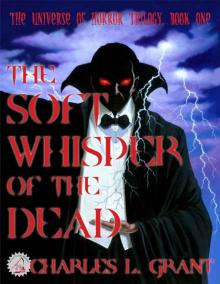 The Universe of Horror Volume 1: The Soft Whisper of the Dead (Neccon Classic Horror)
The Universe of Horror Volume 1: The Soft Whisper of the Dead (Neccon Classic Horror)![[Oxrun Station] Dialing The Wind Read online](http://i1.bookreadfree.com/i/03/19/oxrun_station_dialing_the_wind_preview.jpg) [Oxrun Station] Dialing The Wind
[Oxrun Station] Dialing The Wind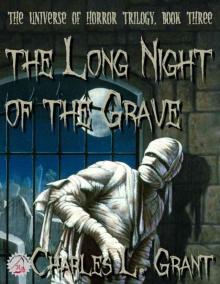 The Universe of Horror Volume 3: The Long Night of the Grave (Neccon Classic Horror)
The Universe of Horror Volume 3: The Long Night of the Grave (Neccon Classic Horror)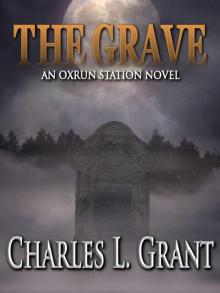 The Grave - An Oxrun Station Novel (Oxrun Station Novels)
The Grave - An Oxrun Station Novel (Oxrun Station Novels)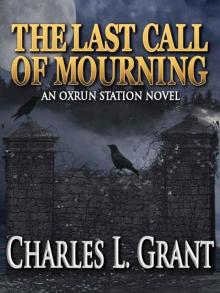 The Last Call of Mourning - An Oxrun Station Novel (Oxrun Station Novels)
The Last Call of Mourning - An Oxrun Station Novel (Oxrun Station Novels)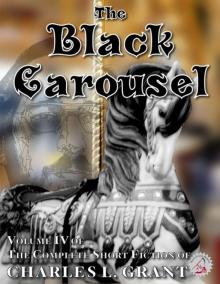 The Complete Short Fiction of Charles L. Grant, Volume IV: The Black Carousel
The Complete Short Fiction of Charles L. Grant, Volume IV: The Black Carousel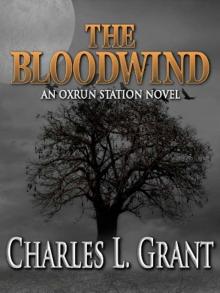 The Bloodwind - An Oxrun Station Novel (Oxrun Station Novels)
The Bloodwind - An Oxrun Station Novel (Oxrun Station Novels)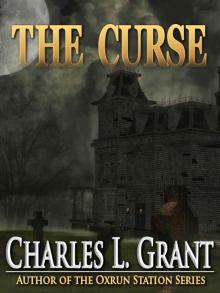 The Curse
The Curse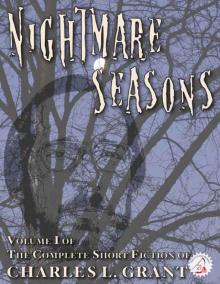 The Complete Short Fiction of Charles L. Grant Volume 1: Nightmare Seasons (Necon Classic Horror)
The Complete Short Fiction of Charles L. Grant Volume 1: Nightmare Seasons (Necon Classic Horror)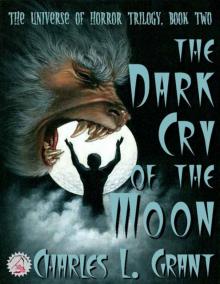 The Universe of Horror Volume 2: The Dark Cry of the Moon (Neccon Classic Horror)
The Universe of Horror Volume 2: The Dark Cry of the Moon (Neccon Classic Horror)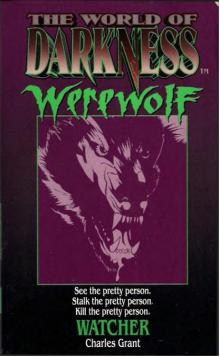 Watcher: Based on the Apocalypse (World of Darkness : Werewolf)
Watcher: Based on the Apocalypse (World of Darkness : Werewolf)![[Oxrun Station] The Bloodwind Read online](http://i1.bookreadfree.com/i/03/25/oxrun_station_the_bloodwind_preview.jpg) [Oxrun Station] The Bloodwind
[Oxrun Station] The Bloodwind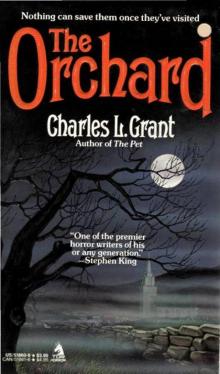 The Orchard
The Orchard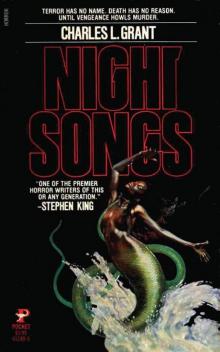 Night Songs
Night Songs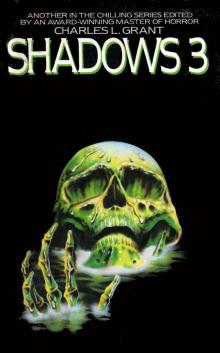 Shadows 3
Shadows 3![Symphony - [Millennium Quartet 01] Read online](http://i1.bookreadfree.com/i1/04/02/symphony_-_millennium_quartet_01_preview.jpg) Symphony - [Millennium Quartet 01]
Symphony - [Millennium Quartet 01] The Hour of the Oxrun Dead (Necon Classic Horror)
The Hour of the Oxrun Dead (Necon Classic Horror)![In the Mood - [Millennium Quartet 02] Read online](http://i1.bookreadfree.com/i1/03/31/in_the_mood_-_millennium_quartet_02_preview.jpg) In the Mood - [Millennium Quartet 02]
In the Mood - [Millennium Quartet 02]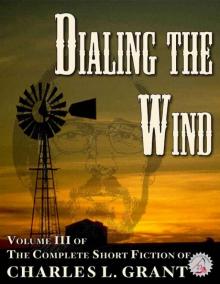 The Complete Short Fiction of Charles L. Grant Volume 3: Dialing the Wind (Neccon Classic Horror)
The Complete Short Fiction of Charles L. Grant Volume 3: Dialing the Wind (Neccon Classic Horror)![[Oxrun Station] The Last Call of Mourning Read online](http://i1.bookreadfree.com/i2/04/05/oxrun_station_the_last_call_of_mourning_preview.jpg) [Oxrun Station] The Last Call of Mourning
[Oxrun Station] The Last Call of Mourning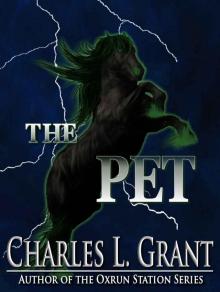 The Pet
The Pet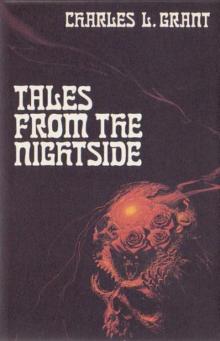 Tales from the Nightside
Tales from the Nightside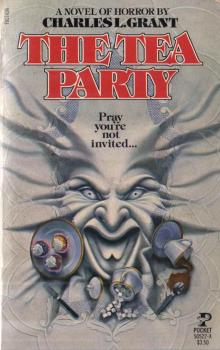 The Tea Party - A Novel of Horror
The Tea Party - A Novel of Horror The Complete Short Fiction of Charles L. Grant Volume 2: The Orchard (Necon Classic Horror)
The Complete Short Fiction of Charles L. Grant Volume 2: The Orchard (Necon Classic Horror) Whirlwind
Whirlwind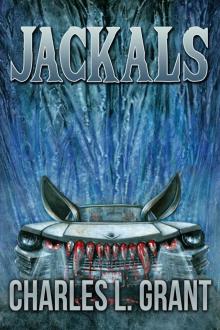 Jackals
Jackals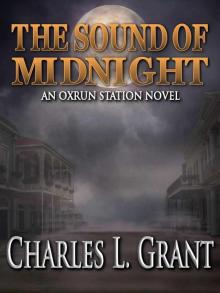 The Sound of Midnight - An Oxrun Station Novel
The Sound of Midnight - An Oxrun Station Novel